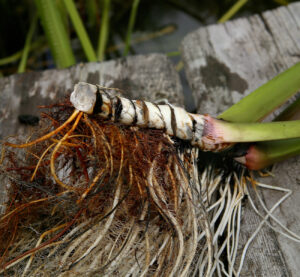Acorus Calamus (Vacha) in Ayurveda: Ancient Wisdom Meets Modern Science.
Introduction Acorus Calamus, commonly known as Vacha in Ayurveda, holds a prominent place in the ancient healing system due to its wide range of health benefits and therapeutic properties. Vacha, meaning “speech,” is revered for its ability to enhance communication, memory, and cognitive clarity. Often used in Ayurvedic formulations, it acts as a natural remedy for various ailments related to the nervous system, digestive health, and respiratory functions. Today, modern studies validate many traditional uses, showing the pharmacological potential of this herb.
Botanical Overview and Properties Acorus Calamus (Vacha) is a semi-aquatic, perennial plant found across India, Sri Lanka, Europe, and North America. Known for its sweet flag-like aroma, the plant is rich in bioactive compounds like alpha- and beta-asarone, which give it significant medicinal potency. Ayurveda classifies Vacha as pungent and bitter with warming properties, making it ideal for balancing Kapha and Vata doshas. Its usage extends from traditional tonics and powders to essential oils, targeting numerous health issues.
Ayurvedic Benefits and Uses of Acorus Calamus (Vacha)
Supports Cognitive Health and Mental Clarity
Memory Enhancer: Acorus Calamus is lauded in Ayurveda for its ability to boost memory and cognitive function. It is traditionally used to support mental clarity, enhance focus, and improve concentration, benefiting students and professionals alike.
Stress and Anxiety Relief: Known for its calming properties, Vacha helps alleviate stress and anxiety, promoting a balanced mental state. The herb’s grounding effects make it useful for those dealing with symptoms of insomnia and restlessness.
Antidepressant and Neuroprotective Potential: Modern studies found in databases like PubMed reveal that Acorus Calamus possesses antidepressant and neuroprotective qualities, suggesting a promising role in managing neurodegenerative disorders like Alzheimer’s and Parkinson’s.
Promotes Digestive Health
Improves Digestion: Vacha is recognized as a digestive stimulant. It helps relieve issues like bloating, gas, and indigestion by improving the secretion of digestive enzymes.
Anti-Inflammatory Properties: Studies have shown Acorus Calamus’s potent anti-inflammatory and anti-spasmodic actions, which aid in soothing the gastrointestinal tract. This property is especially beneficial in relieving discomfort associated with irritable bowel syndrome (IBS) and colic.
Natural Appetite Stimulant: Ayurveda suggests Acorus Calamus as a natural remedy to boost appetite and treat anorexia. Regular intake in controlled amounts can help regulate eating patterns, improving nutrient absorption.
Enhances Respiratory Health
Eases Respiratory Discomfort: Vacha has been used for centuries as a remedy for respiratory problems like asthma, bronchitis, and cough. Its expectorant properties help clear mucus, making it easier to breathe.
Antimicrobial Action Against Respiratory Pathogens: Research published on PubMed confirms Acorus Calamus’s antimicrobial efficacy, especially against pathogens affecting respiratory health, making it a beneficial component in respiratory tonics.
Skin Health and Antioxidant Benefits
Rich in Antioxidants: Antioxidants in Acorus Calamus combat free radicals, thereby slowing the aging process and maintaining skin elasticity. Regular topical or oral usage can protect skin cells from oxidative stress.
Wound Healing and Antimicrobial Properties: The antimicrobial and anti-inflammatory properties make it useful for treating skin conditions like eczema, fungal infections, and minor wounds. Traditional Ayurvedic ointments often incorporate Vacha to enhance skin regeneration and healing.
Pain Relief and Anti-Inflammatory Properties
Relieves Joint Pain: Due to its anti-inflammatory properties, Vacha is frequently recommended in Ayurvedic medicine to alleviate joint pain and inflammation associated with arthritis. When applied topically, it acts as a natural pain reliever, providing a warming sensation.
Muscle Relaxant: The muscle-relaxing abilities of Acorus Calamus are useful in soothing cramps and muscle spasms. Research studies validate its potential as a natural analgesic, contributing to its frequent use in Ayurvedic pain-relief therapies.
Scientific Evidence Supporting Acorus Calamus Benefits
Research into Acorus Calamus’s therapeutic properties has grown in recent years, with many studies found in databases like PubMed supporting its traditional uses. Here are a few notable findings:
Cognitive Enhancement and Neuroprotection: Research highlights that bioactive compounds in Acorus Calamus, particularly beta-asarone, exhibit neuroprotective effects, which could slow cognitive decline in age-related disorders.
Antimicrobial and Antioxidant Properties: Multiple studies confirm that Acorus Calamus is effective against bacterial and fungal strains, lending scientific support to its traditional use as an antimicrobial agent.
Anti-inflammatory and Pain Relief Effects: The plant’s essential oils show significant anti-inflammatory activity, reinforcing its efficacy in managing arthritis, muscle pain, and skin irritations.
How to Use Acorus Calamus (Vacha) Safely
While Vacha offers extensive health benefits, it’s essential to use it correctly to avoid potential side effects. Here are some commonly used forms:
Powder: Used for digestive health and cognitive enhancement, usually taken with honey or warm water.
Essential Oil: Commonly applied topically for joint pain or muscle aches; however, it must be diluted as it can be potent in concentrated form.
Capsules or Extracts: Used in Ayurvedic medicine for respiratory and digestive benefits, typically taken under professional guidance.
Dosage and Precautions: In Ayurveda, the dosage of Acorus Calamus varies based on individual needs, and it is best consumed under the guidance of an Ayurvedic practitioner. Excessive use of Vacha may lead to toxicity due to the presence of certain bioactive compounds. Pregnant and breastfeeding women, as well as individuals with pre-existing medical conditions, should consult a healthcare provider before using this herb.
Conclusion: Acorus Calamus – A Timeless Ayurvedic Remedy for Modern Wellness.
Acorus Calamus (Vacha) represents the confluence of traditional Ayurvedic wisdom and modern scientific validation. With benefits that span cognitive health, digestion, respiratory wellness, and pain relief, this versatile herb holds tremendous potential in natural health solutions. Scientific studies continue to affirm the effectiveness of Acorus Calamus, adding to its value as a herbal remedy that supports holistic health. When used responsibly and under expert guidance, Vacha can be an effective addition to a balanced Ayurvedic regimen, helping individuals achieve enhanced wellness naturally.
By incorporating Acorus Calamus (Vacha) into everyday wellness routines, individuals can embrace Ayurveda’s timeless wisdom while benefiting from research-backed insights for optimal health.
This content provides a comprehensive overview of Acorus Calamus , aligned with Ayurvedic practices and supported by research insights from credible sources like PubMed.
SOURCE : https://pubmed.ncbi.nlm.nih.gov/?term=Acorus+Calamus






